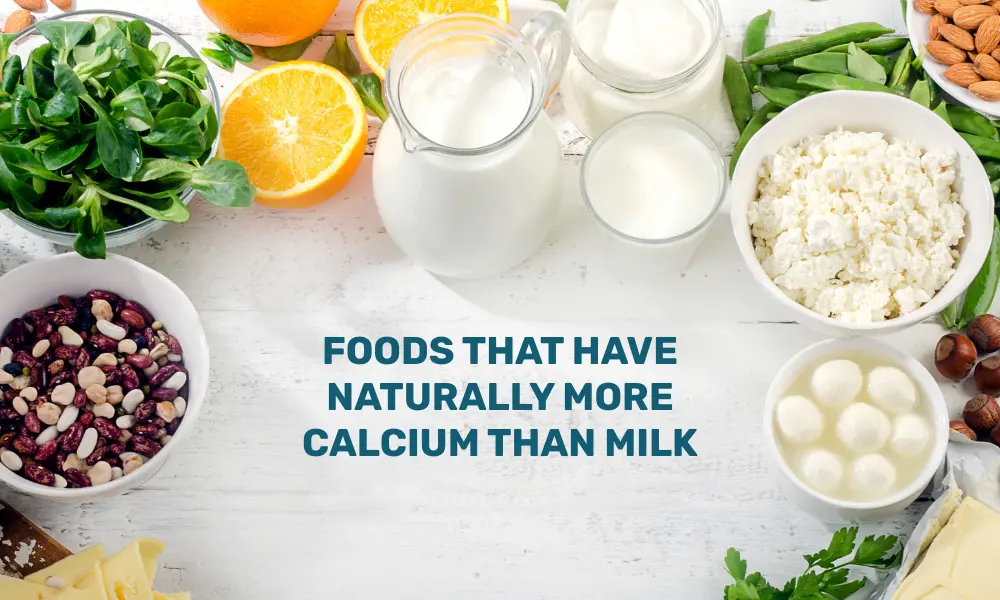Calcium is one of the key minerals within our body. It is not just vital for developing healthy bones and teeth, but also for contracting muscles, nerve function, and hormonal secretion. The first food that most people think of when they mention calcium is milk. Though milk is an excellent source, it is not the only one and most definitely not the most.
Most people, particularly those who are lactose intolerant, vegan, or plain don’t like milk, end up fretting about calcium intake. The best part is that many plant-based and non-dairy foods have even higher amounts of calcium than milk. A glass (250 ml) of milk contains approximately 300 mg of calcium.
Our in-house expert, Dt. Aparna Pandey, MSC in Nutrition and Dietetics, shares a list of super alternatives that contain higher amounts of calcium per serving and some added health benefits as well.
1. Sesame Seeds (Til)
Sesame seeds are one of the richest natural sources of calcium. Just one tablespoon of sesame seeds contains about 88 mg, and 100 grams offers over 975 mg of calcium. You can add roasted sesame seeds to salads, chutneys, laddoos, or even mix them into atta while making roti.
Include tahini (sesame paste) or til chutney in meals for a calcium boost.
2. Ragi (Finger Millet)
Ragi is an old Indian millet that is packed with calcium. 100 grams of ragi has about 344 mg of calcium, more than milk! It is also a good source of fiber and iron, making it a healthy food for women, kids, and the elderly.
How to consume: Ragi dosa, ragi porridge, or ragi roti.
3. Amaranth Leaves (Chauli)
These dark green leafy greens are not just a source of calcium, but also contain magnesium and vitamin K nutrients that facilitate calcium absorption. 100 grams of cooked amaranth greens have approximately 275 mg of calcium.
How to consume: Lightly cook them to retain nutrients. Serve with dal or add to saag.
4. Moringa Leaves (Drumstick Leaves)
Moringa is a nutritional wonder. 100 grams of freshly chopped moringa leaves can give 350 mg of calcium. They also have vitamin A, C, and antioxidants.
Tip: Add moringa to soups, dry sabzi, or even as a powder in smoothies or chapati dough.
5. Almonds
Almonds are not only a wonderful source of healthy fats and protein but also a good source of calcium. 100 grams of almonds provide about 264 mg of calcium. Even a daily handful of almonds can make a big contribution to your intake.
How to consume: Overnight soaking enhances digestibility.
6. Tofu (Set Soy Paneer)
Tofu is a soybean product and contains calcium naturally, particularly if it’s calcium-set. 100 grams of tofu can provide between 350–600 mg of calcium, depending on how it’s prepared.
How to consume: Stir-fry it with veggies, grill it, or include it in salads.
7. Bok Choy (Chinese Cabbage)
This cruciferous vegetable has around 160 mg of calcium per 100 grams and is also more readily absorbed by the body than dairy calcium.
How to consume: Add to stir-fries or soups.
Key Takeaways
-
Plant-based calcium is usually absorbed better than dairy calcium, particularly in combination with vitamin D, magnesium, and vitamin K2.
-
Soaking, fermenting, or gentle cooking of foods such as spinach or amaranth lowers oxalates, which otherwise block calcium absorption.
-
In individuals who are lactose intolerant, a well-planned, varied whole food diet can provide adequate calcium daily without supplements.
-
Adults need around 1000–1200 mg of calcium per day, and children and teenagers need even larger amounts during periods of rapid growth.
In a Nutshell
Aparna advises to look beyond the obvious and seek calcium foods naturally available in our Indian household kitchen. Whether you have osteoporosis, are planning to be pregnant, or simply want to be healthier with better bones, remember that calcium is not only in milk. With good planning and conscious combinations, you can easily fulfil your daily calcium requirements tastefully and naturally. For more such nutrition related tips – CLICK HERE!
Disclaimer: This article is meant for informational purposes only and must not be considered a substitute for professional advice.





